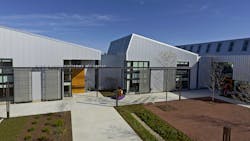Custom engineered using integrated design and fabrication technologies, metal building systems are increasingly versatile, expressive and cost-effective for a range of architectural styles and building applications. This course describes sustainable directions in the custom-engineered, BIM-driven approaches as they are applied to varied architectural applications, end-uses and design challenges. From structural framing basics and fabrication capabilities to modular and panelized systems, the applications present a wide variety of roof and fenestration options, creative forms, and options for future expansion planning. Typical construction processes and applications are shown to potentially reduce overall building costs, boost construction speed and enhance durability, sustainability and resilience. Case studies in the commercial and institutional sectors provide useful examples of cost-effective and creative solutions with metal architecture.
Learning Objectives:
- EXPLAIN the use of metal building systems in terms of structural makeup, design complexity, custom steel fabrication capabilities and CAD/BIM integration.
- DESCRIBE how metal architecture can incorporate multiple framing systems, modular designs, mezzanines, panelized wall systems or IMPs, and varied roof and fenestration structures to increase expressive possibilities and allow for facility expansion.
- LIST typical construction and erection methods and how the processes can reduce building structural framing costs, speed and simplify construction sequencing, and enhance durability, sustainability and resilience.
- DISCUSS how metal building systems are developed and employed in various types and applications, including case studies of commercial, institutional, cultural, educational and civic buildings, including multistory and large-span examples.
